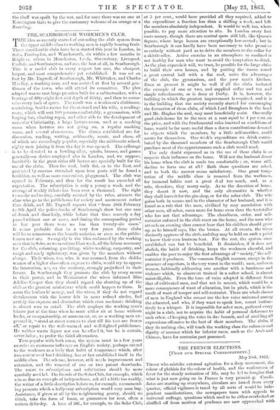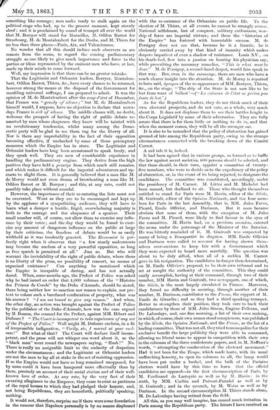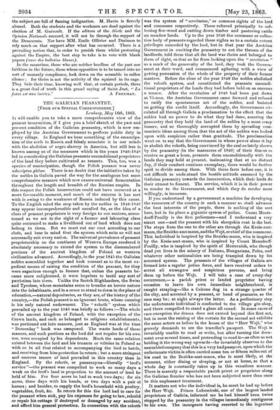THE FRENCH ELECTIONS. [FROM OUR SPECIAL CORRESPONDENT.] TnosE who mistake
external agitation for a deep movement, the colour of phthisis for the colour of health, and the restlessness of fever for the steady animation of life, may be led to imagine that what is just now going on in France is very promisii,g. Candi- dates are starting up everywhere, circulars are issued from every quarter, official vigilance is taxed by all sorts of would-be inde- pendent manifestations, the newspapers teem with appeals to universal suffrage, questions which used to be either overlooked or shuffled off from motives of prudence are now approached with something like courage ; men make ready to stalk again on the political stage who had, up to the present moment, kept sternly aloof ; and it is proclaimed by sound of trumpet all over the world that M. Berryer will stand for Marseilles, M. Odilon Barrot for Strasbourg, M. de Montalembert for the Doubs, and M. Thiers for no less than three places—Paris, Aix, and Valenciennes.
No wonder that all this should induce such observers as are remote from the scene, to regard the coming parliamentary struggle as one likely to give much importance and force to the parties or ideas represented by the eminent men who have, at last, made up their minds to come forward.
Well, my impression is that there can be no greater mistake.
That the Legitimist and Orleanist leaders, Berryer, Montalem- bert, Odilon Barrot, 'Thiers, &c., have every chance to be returned, however strong the means at the disposal of the Government for moulding universal suffrage, I am prepared to admit. It was the opinion of M. de Montalembert after the coup d'etat of December, that France was "greedy of silence;" but M. de Montalembert himself would, I suppose, have no objection to declare that nowa- days France is sick of silence. The middle classes will, no doubt, welcome the prospect of having the right of public debate re- asserted by men whose eloquence they know will be tainted with no revolutionary tendencies, whilst many among the Demo- cratic party will be glad to see them tug for the liberty of all. Nor is there any improbability in the fact of their opposition becoming effective, if unchecked by some of those peremptory measures which the Empire has in store. The Legitimist and Orleanist leaders have long been accustomed to speak freely, and they speak well. They are men of considerable experience in handling the parliamentary engine. They derive from the high position they have held a prestige from which much still remains, and which makes it difficult for the imperial adventurers and up- starts to slight them. It is generally believed that a man like M. de Morny would not even dream of browbeating a man like M. Odilon Barrot or M. Berryer ; and this, at any rate, could not possibly take place without scandal.
However, the importance of their re-entering the lists must not be overrated. Wont as they are to be encouraged and kept up by the applause of a sympathizing audience, they will have to learn what a damper a hostile, frigid, overwhelming majority is both to the courage and the eloquence of a speaker. Their small number will, of course, not allow them to exercise any influ- ence by their votes ; and the day they would be found to exer- cise any amount of dangerous influence on the public at large by their criticism, the freedom of debate would be as easily withheld as it was insolently granted. The Economist is per- fectly right when it observes that "a few steady malcontents may become the nucleus of a very powerful opposition, so long as free speech is permitted at all." Just so. But who will warrant the inviolability of the right of public debate, where there is no liberty of the press, no passibility of concert, no means of organized resistance? Can anything be mentioned which the Empire is incapable of daring, and has not actually dared. When, some months ago, the Prefect of Police was asked why he had issued an order that 4,000 volumes of the " Histoire des Princes de Conde" by the Duke d'Aumale, should be siezed, there being neither law to sanction nor reason to explain, nor pre- text to colour such a barefaced confiscation of property, what was his answer ? "I am not bound to give any reason." And when, the other day, an action was brought against the Prefect of Police by the publisher of the Duke d'Aumale, how was the case argued by M. Busson, the counsel for the Prefect, against MM. Hibert and Dufaure ? "The Court is incompetent to take cognizance of any act of the Prefect of Police." Well might M. Dufaure exclaim, in a fit of irrepressible indignation, " Verily, sir, I marvel at your cool- ness!" But what of that? The Court will declare itself incom- petent, and the press will not whisper one word about it, as the "black man" went round the newspapers saying, "Hush !" No. There is really no assignable limit to the audacity of despotism under the circumstances ; and the Legitimist or Orleanist leaders are not the men to lay all at stake in the act of resisting oppression. If so the Empire would not have so long remained unopposed, for by none could it have been hampered more effectually than by them, precisely on account of their social station and of their well- known love of order. At any rate, by the very fact of their swearing allegiance to the Emperor, they cease to exist as partizans of the royal houses to which they had pledged their honour, and, not being Republicans, they are henceforth, politically' speaking, nothing.
It would not, therefore, surprise me if there were some foundation in the rumour that Napoleon personally is by no means displeased
with the re-entrance of the Orleanists on public life. To the election of M. Thiers, at all events, he cannot be strongly averse. National selfishness, lust of conquest, military enthusiasm, wor- ship of force are imperial virtues; and these the "historian of the Empire" has fostered with lamentable success. 1St. de Persigny does not see that, because he is a fanatic, he is obviously carried away by that kind of insanity which makes despots impatient of even a shadow of resistance. Louis XV., on his death-bed, flew into a passion on hearing his physician say, while prescribing the necessary remedies, "This is what must be done." M. de Persigny, a second-hand despot, would fain speak in that way. But, even in the entourage, there are men who have a much clearer insight into the situation. M. de Morny is reported to have said, hpropos of the re-appearance of M31. Berryer, Thiers, &c., on the stage, "The ship of the State is not now like to be lost from want of ballast"—(" La vaisseau de l'e'tat ne perira pas mute de lest') As for the Republican leaders, they do not think much of their own electoral prospects, and do not care, as a whole, very much about it. It does not displease them to see their battles fought in the Corps Legislatif by some of their adversaries. 'They are fully aware that there is for them little or nothing to do in, and that when the moment comes, they will be all the stronger out.
It is also to be remarked that the policy of abstention has gained ground of late among the Republican party, owing to the strange circumstances connected with the breaking down of the Comite Carnot.
A sad tale it is, indeed.
It had been agreed that in various groups, so formed as to baffle the law against secret societies, 600 persons should be selected, and that these should, in their turn, appoint a committee of twenty- five members, who were to decide as to the expediency of the policy of abstention, or, in the event of its being rejected, to designate the candidates. The committee was constituted, accordingly, under the presidency of M. Carnot. 151. Littre and M. Michelet had been named, but declined to sit. Those who thought themselves entitled to stand for Paris were 3:11. Ilavin, editor of the Siècle, M. Gueroult, editor of the Opinion Nationale, and the four mem- bers for Paris in the last Assembly, that is, MM. Jules Favre, Picard, Emile 011ivier, and Darimon. But it soon became obvious that none of them, with the exception of 151. Jules Favre and M. Picard, were likely to find favour in the eyes of the committee. M. Havin had, on a previous occasion, entered the arena under the patronage of the Minister of the Interior. He was bitterly reminded of it. M. Gueroult was suspected by many of being a Bonapartist in disguise. MM. Emile 011ivier and Darimon were called to account for having shown them- selves over-anxious to keep fair with a Govermnent which they were expected to beard more manfully. The question was about to be duly sifted, when all of a sudden M. Carnot gave in his resignation. The candidates in danger then determined, on M. Emile 011ivier's proposal, to be their own tribunal and to set at naught the authority of the committee. This they could easily accomplish, having at their command, through two of their number, MM. Havin and Gueroult, two newspapers, one of which, the Siècle, is the most largely circulated in France. Moreover, they found no difficulty in securing, through another of their number, M. Darimon, contributor to the Presse, the support of M. Emile de Girardin ; and so they had a third speaking-trumpet. Better to strengthen their position, they took care to back their candidatures by those of MM. Jules Simon, Eugene Pelletan, and De Laboulaye, and, one fine morning, a list of their own making, in which, of course, their own names stood conspicuous, was published by the Siècle, the Opinion IVationale, and the Presse, as the list of a leading committee. That was not all, they tried to monopolize for their exclusive benefit the large publicity they were able to command, allowing no liberal name to appear in competition with their own in the columns of the three confederate papers, and, in M. Nefftzer's words, "attempting the confiscation of the electoral movement." Had it not been for the Temps, which made haste, with its usual unflinching honesty, to open its columns to all, the lamp would have been put under a bushel, and the bulk of the Parisian electors would have by this time to learn that the official candidates are opposed—in the first circumscription of Paris, by M. Ferdinand de Lasteyrie as well as by M. Ilavin ; in the sixth, by MM. Cochin and Prevost-Paradol as well as by M. Gueroult ; and in the seventh, by M. Weiss as well as by Darimon, In the second circumscription 151. Thiers stands alone, M. De Laboulaye having retired from the field. All this, as you may well imagine, has caused much irritation in Paris among the Republican party. The letters I have received on the subject are full of flaming indignation. M. Havin is fiercely abuied. Both the students and the workmen are dead against the election of M. Gueroult. If the editors of the Siecle and the Opinion Nationale succeed, it will not be through the support of the Democrats. Nor have MM. Emile 011ivier and Darimon to rely much on that support after what has occurred. There is a prevailing notion that, in order to punish them whilst protesting against the Empire, the best step to take is to vote with blank papers (arec des bulletins blancs).
In the meantime, those who are neither heedless of the past nor faithless in the future, those whose opposition is to be tamed into no sort of unmanly compliance, look down on the scramble in sullen silence ; for theirs is not the activity of the squirrel in its cage. They bide their time, knowing well that, at certain periods, there is a great deal of truth in this grand saying of Saint Just, "La
































 Previous page
Previous page